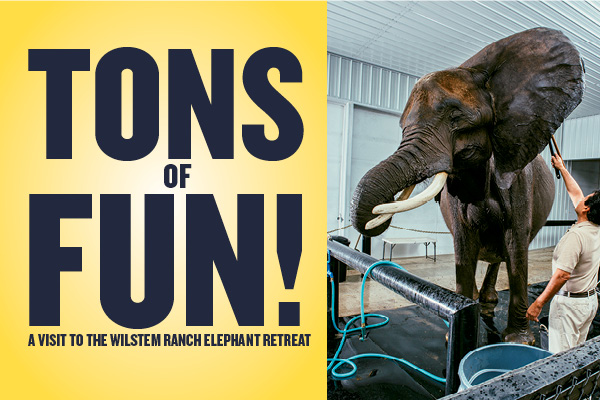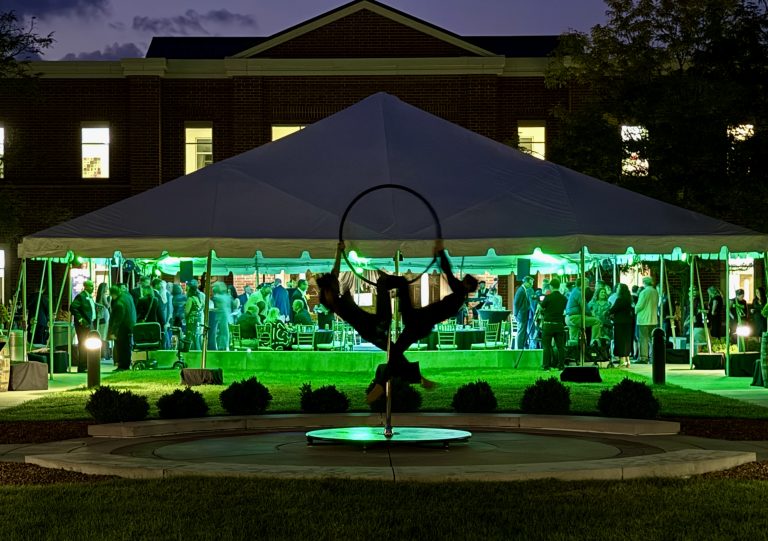
BY STACY THOMAS | PHOTOS BY ANTONIO PANTOJA
 I am sure you have heard a similar story before: Three middle-aged ladies, life-long friends retire together and live on a ranch eight months out of the year, and spend four months in the winter at their home in Sarasota, Fla. Now, in my version of the tale, these particular ladies – Makia, 42, Lovie, 32, and Lou, 31 – also enjoy daily spa treatments, including mineral baths and pedicures. Then, after breakfast and a daily trip to the spa, the girls set out to leisurely explore nature on their own private 10 acres of land. Throughout the day, they hike, walk, relax and rest, the true epitome of retirement. In the evening, they gather at the lodge for an abundant dinner that is specially prepared to accommodate their strict vegan diet.
I am sure you have heard a similar story before: Three middle-aged ladies, life-long friends retire together and live on a ranch eight months out of the year, and spend four months in the winter at their home in Sarasota, Fla. Now, in my version of the tale, these particular ladies – Makia, 42, Lovie, 32, and Lou, 31 – also enjoy daily spa treatments, including mineral baths and pedicures. Then, after breakfast and a daily trip to the spa, the girls set out to leisurely explore nature on their own private 10 acres of land. Throughout the day, they hike, walk, relax and rest, the true epitome of retirement. In the evening, they gather at the lodge for an abundant dinner that is specially prepared to accommodate their strict vegan diet.
When I recently met these ladies, I must admit they weren’t exactly what I was expecting. After all, it’s not every day everyday that you get to meet and help bathe a trio of African elephants. Even more shocking, perhaps, is the fact that said elephants are located in Southern Indiana.
“The Wilstem Ranch has been in my family for 28 years,” said Jerry Fuhs, president of the ranch. Fuhs, an entrepreneur and former concert promoter, purchased the ranch and began a full restoration in 1988 as a personal getaway spot. For the past seven years, Fuhs and long-time friends and elephant owners Jorge and Lou Ann Barreda have been working together to make the Wilstem Elephant Retreat a reality.
“Last year, the elephants were here for six weeks,” Fuhs said. “ We spent the next year after they left making a permanent facility for them at the ranch,” which is located halfway between French Lick and Paoli.
“Elephants have the same life expectancy of the average human, about 50 to 60 years,” explained Jorge Barreda, who has been around exotic animals his entire life. “As a kid, my father used to train big cats (lions) and chimps for the circus in Oklahoma.”

Makia originally came from Kruger National Park in South Africa as an orphan. Her previous owner (who owned Asian elephants) had her for several years and approached the Barredas about re-homing her with their two African elephants. “Elephants are social herd animals. The Asian elephants would shy away from Makia, leaving her solitary and isolated,” said Jorge Barreda. “We got Makia when she was 11 years old.”
When Makia met her new sisters Lovie and Lou, she immediately took on her new role as matriarch of the herd.
“With elephants, the healthiest and strongest female takes over … usually the oldest,” said Jorge Barreda. “We got Lovie and Lou when they were both just a year and a half. Lou is from Zimbabwe; Lovie is from Kruger National Park, same as Makia.”
Kruger National Park is a wildlife preserve in South Africa. The elephants were orphaned due to lack of vegetation and grazing land.
 That morning when I arrived to the ranch, Makia was already enjoy her daily spa service that consisted of a bath and brushing her tusks. My “assistant” that day was Brahm Kleinert, who is 5 years old. Brahm was dressed the part in his galoshes but decided at the last minute that I should be the one to assist with Makia instead of him. When asked if he wanted to paint the elephant’s toenails, he declined. I could definitely understand his intimidation. Makia weighs 10,000 pounds (five tons) and is twice as tall as the tallest human. Still, the elephants are among the most easy-going creatures I have ever met.
That morning when I arrived to the ranch, Makia was already enjoy her daily spa service that consisted of a bath and brushing her tusks. My “assistant” that day was Brahm Kleinert, who is 5 years old. Brahm was dressed the part in his galoshes but decided at the last minute that I should be the one to assist with Makia instead of him. When asked if he wanted to paint the elephant’s toenails, he declined. I could definitely understand his intimidation. Makia weighs 10,000 pounds (five tons) and is twice as tall as the tallest human. Still, the elephants are among the most easy-going creatures I have ever met.
As soon I as started talking to the Barredas, Makia extended her trunk inches away from my face. She allowed me to touch her, and I got to paint her nails with mineral oil to prevent cracking. Elephants are fond of showers and afterwards will coat themselves with a protective layer of dust. The callous spots on their skin provide an extra layer of sun protection.
After her shower and pedicure, Makia was reunited with Lovie and Lou. They verbally greeted one another and intertwined their trunks to show affection. The next part of the retreat experience involves a 25-minute educational talk about elephants.
“African elephants are generally pretty healthy. They can develop arthritis, and they are generally slow movers at a walking pace of 25 miles per hour,” said Jorge Barreda. “Elephants get four to six sets of teeth throughout their life span. Eventually, they lose all of their teeth in old age, which is a leading cause of death from inability to chew grass and get the proper nutrients.”
It is true that elephants have an impeccable memory. They can pick people out of a crowd and can remember water locations from years ago and miles away. Elephants are only afraid of what they have never seen or heard.
The Barredas stay at the Wilstem Ranch with the elephants for the duration of their visit. “We don’t leave them, ever,” said Lou Ann Barreda. “They require a lot of attention and constant care. It’s sort of like we have three toddlers.”
Lou Ann Barreda also added the other “exotic” animal they own is Chloe, a Westie and little sister to her very, very big siblings.
With spa services complete, the barn doors opened, and the girls headed out to graze in the pasture for the afternoon.
“They graze on grass all day long,” said Jorge Barreda. “They each eat four large bales of hay per day (grown on the ranch), along with 25 pounds of grains and vegetables and fruit as a treat. They also enjoy the bark and leaves of the Indiana maple trees for the sweetness.”
Brahm and I watched as the elephants made their way into the pasture. He enjoyed watching them throw dirt on their backs as they rooted for “medicine” (he meant vitamins found in the soil). He also liked how smooth their “horns” – also known as tusks – were. I loved watching Brahm.
I left the ranch but not before saying goodbye to the Barredas and Fuhs.
“I’m going to go look at giraffes next,” Fuhs said. “I’m not going to get them yet. I’m going to get educated first.”
ELEPHANT EDUCATION | AFRICAN VS. ASIAN
Ears: African elephants have large ears shaped like the continent of Africa. Hundreds of tiny capillaries in the ear release excess heat to cool the animals in a treeless desert landscape. Asian elephants have smaller, more flat ears conducive to a cooler jungle climate.
Head Shape: African elephants have a full, round head with a single dome shape. Asian elephants have a twin dome with a slight indention at the top of the head.
Tusks: In African elephants, both sexes generally (but not always) develop tusks. In Asian elephants, only males grow tusks. Even then, sometimes nature skips a few.
Herds: Elephants are herd animals, similar to cattle. In fact, females are often referred to as cows, males as bulls. Elephants live within definitive social structures lead by the eldest female. The herds are comprised of her daughters, sisters, and their offspring. Once male calves reach puberty, they leave the mother’s herd and join other young males in bachelor groups. Older male elephants tend to be solitary.
Trunks: The tip of an African elephant trunk contains two “fingers” for grasping, while the trunk of an Asian elephant only contains one.
Weight & Height: African elephants are the largest land animals on earth and are slightly larger than their Asian cousins. The weight range for an African elephant is 8,800 to 15,400 pounds – several tons more than the Asian elephant’s 6,600 to 13,200 pound weight range. African elephants range from 9 to 13 feet tall, just slightly taller than the 7- to 9-foot Asian elephant.
OH BABY! At birth, the average elephant stands at 3 feet tall and weighs over 200 pounds.
SALAD BAR: Elephants are herbivores that eat grasses, fruit, and bark – lots of them. An adult elephant eats up to 300 pounds of food per day. This leaves little time for sleeping since they are constantly roaming to satisfy their appetites to sustain their massive stature.
 WILSTEM RANCH | US 150-SR 56 (between French Lick & Paoli) Call 812.936.4484 | wilstemranch.com
WILSTEM RANCH | US 150-SR 56 (between French Lick & Paoli) Call 812.936.4484 | wilstemranch.com
Reservations Required
All tickets can be purchased through the Wilstem Ranch Website.
Elephant Encounters take place daily (except Mondays) March through October.
Spa Experience (2 hours/$59 per person; $49 ages 12 and under) Times: 9:30 a.m and 3 p.m.
Educational Seminar (1 hour/$25 per person; children 2 and under are free) Times: 10:30 AM and 4 PM EDT
In addition to elephants, the Wilstem Ranch is home to: horses; mini horses; donkeys; goats; rabbits; ducklings; and miniature brahma bulls. Blake Compton is the Outdoor Activities Director for Wilstem Ranch. “The Elephant Retreat is a one of a kind experience that is hard to find anywhere. In addition, we also have zip lines, horseback riding, ATV tours, wedding and event spaces and guest cabin rentals,” said Compton. “I love working here. I work with great people … a small family that understands, loves and supports Jerry (Fuhs) and his vision and great ideas. I am excited for the next few years to come.”
















